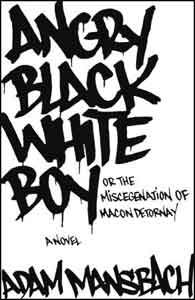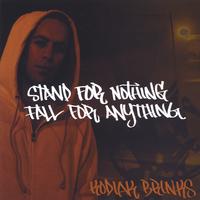Forum
- Home
- Forum
White imposter-- and kike who looks like kike Billy Joel, i.e. hip hop
[color="red"]kike Adam Mansbach. Be sure to read his White History Month essay at the bottom of this post.:

http://www.adammansbach.com/about.html
Mansbach’s next novel, The End of the Jews,
(Read the crap right here. -Chain)
http://209.85.135.104/search?q=cache:i-e2_ZUUCZMJ:zeek.net/fiction_0512.shtml+adam+mansbach%2Bthe+end+of+the+jews&hl=en&ct=clnk&cd=1
will be published in 2007 by Spigel & Grau/Random House. It was one of the first acquisitions by the new Random House division, and will be among the first books they publish.

"..So I really forefront my own Whiteness..." he declares at 05:59 in this NPR interview- At 06:52 "I don't really like White people."
http://www.publicradio.org/tools/media/player/minnesota/radio/the_current/features/2005/05/20050511_mansbach.ram

Adam Mansbach does not fit the profile of the typical hip-hop artist.
He's white, he's blonde, [color="red"]he's Jewish, and he hails from an affluent Boston suburb. But hip-hop is what the 25-year-old Mansbach does, and does well. When he's not writing or performing his hip-hop-inspired poetry, he's often hanging out with other hip-hop artists or writing about the hip-hop scene.Soon Mansbach was dressing like the black kids, speaking like the black kids, and enduring the taunts of other kids in his largely Jewish and upper middle-class community. "Hey, Mans-black," they said. "Hey look, it's Adam Mans-black."
But Mansbach didn't mind the teasing, at least not enough to stop him from hanging out with the black kids. [color="red"] "There's a coolness associated with being black and a coolness in associating with the blacks," he says. "The other kids couldn't get near it. And I think they understood that."
...When it came time to choose colleges, Mansbach did not have to think hard. [color="red"]He chose New York's Columbia University because he wanted to be close to the hip-hop movement he loved. (Fuckin' great-- another kike from Columbia to propagandize us. Hey Al Qaeda, you ever hear of Columbia University in New York City?)
...Today, Mansbach supports himself by teaching, writing, and performing. At a recent show, sponsored by the New York Jewish Community Center, he wailed about the injustices done to black people, while the mostly white, Jewish audience nodded their heads to his words.
Some of his poems, however, do also touch on Jewish themes: "and this chick/is talkin bout/they got/a gift shop at auschwitz/at which you can purchase/keychains and coffee mugs/to commemorate your visit/and never forget/like you gon' forget." But Mansbach also has a certain ambivalence towards Judaism.[color="red"] "You know," he says, "I come from three generations of reformed non-religious Jews. Judaism is just not really part of my life." (Fuck You, kike-- but "Whiteness" is?)And his poetry reflects this, too: "She asked me was I jewish/Yes well sort of/Then I dipped/Hit up/Harlem music hut."
The case for 'White History Month'
[color="Red"]By Adam Mansbach | March 8, 2005WITH BLACK History Month -- the shortest of the year, it is often pointed out -- drawn to a close, we bid a fond adieu to public radio tributes to African-American icons and gaze one final time at heartfelt billboard salutes from car manufacturers. In grade-school classrooms across America, timeworn photographs of Martin Luther King Jr., Harriet Tubman, George Washington Carver, and Jackie Robinson are being removed from bulletin boards, tucked away to slumber for another year.
And as winter gives way to spring, the absence of a month that might make all the difference in this racially stratified nation is more glaring than ever.
White History Month.
I speak not of a period of celebration but one of excavation.
White people are everywhere, but whiteness itself -- as an identity, a shared set of assumptions, a state of economic and institutional empowerment -- is perhaps the largest uninterrogated concept of all.
If the initial image conjured by the idea of White History Month is one of white supremacists, it is only because whiteness remains so unanalyzed that hate-mongers have been able to claim it. Whiteness has no form of its own; it is simply normative.
Like an object thrown into the water, we measure the weight of whiteness by what it displaces.
We speak of "minorities," but no American has ever checked a box labeled "majority."
On the simplest level, consider how easily "black" leaps to the tongue. It is the first adjective any white person is likely to employ in describing an African- American. Now consider how many times in your life you have heard a white person choose "white" as the first adjective in a description of a member of his race.
The courage we once had in confronting race has waned, rubbed out by a few advances, an overwhelming white desire to believe they are sufficent, and an ever increasing identification with the cultural artifacts of blackness. Appreciating black artistic genius is as American as baseball, but with appreciation comes the temptation to trade action for identification for whites to absolve ourselves from responsibility for the oppressive conditions from which so much black art springs, simply because we relate so strongly to its truth. But our tastes do not dictate our access to power; our whiteness does. I say this as one reared, artistically and politically, on a diet of hip-hop and jazz.
Even as cultural crossover increases, the space for honest dialogue shrinks. "Race" and "race man" and even "race novel" have become anachronisms. Any suggestion that the skins we're in represent the central issue that cripples and divides Americans -- as it was 50 years ago, in the aftermath of Brown v. Board of Education, and 150 years ago, as the country hurtled inexorably toward civil war -- dates the speaker as surely as a dashiki, a pair of bellbottoms, and an eight-track player.
Page 2 of 2 -- Affirmative action is being dismantled; incarceration and conviction rates for black defendants are nearly double those of whites for the same charges.
ADVERTISEMENT
The New York Times reports that 40 percent of young black men in New York City are unemployed, and that 71 percent of new HIV cases in the United States are black women. Yet race has faded slowly into the ether, like Ralph Ellison's famous, nameless protagonist.If race is the elephant unseen in the middle of the room, then whiteness is the ethereal jockey straddling its back. We need White History Month because white people, just like our black brothers and sisters, need a time to contemplate the nature of our identities.
We must grapple with the legacy of slavery, of Jim Crow, of lynchings and inequality and oppression, that we have inherited and that benefits us still. We must accept the pain that flows from the psychic wounds this history has inflicted upon us.
The air in America is redolent with a violence that has savaged us all, inflictor and inflictee alike.
We must have time, also, to consider our own moments of bravery, solidarity, and empathy -- the moments when race has been eclipsed by humanity. Who would be the icons of White History Month, the faces to be tacked up on elementary school walls when King, Tubman, Carver, and Robinson come down?
Who are the men and women who have struggled most profoundly against what whiteness, in the absence of critique, has so often become?
White people do not come naturally to the double consciousness so aptly described by that other mainstay of February bulletin boards, W.E.B. DuBois: the ability, born of invisibility, to know both ourselves and the Other. Nothing in American life encourages us to think about race, and thus we live secure, serene, secluded, as silent as the halls of power. Every white family might as well live in a tiny gated community all its own.
For the next generation of civil rights victories to be won -- victories both practical, in the justice systems and schools and loan offices of America, and emotional, in all our hearts and minds -- that complacency must be cast aside. We must step willingly into a dialogue that is certain to make us feel guilty, angry, defensive, even clueless.
We must deconstruct and consider that which would be easier to ignore. Until we confront whiteness, we can never be whole.
This is why we need White History Month. Let's make it the longest month of the year.
[color="red"]Adam Mansbach's race novel, "Angry Black White Boy, or The Miscegenation of Macon Detornay," has just been published.

Hey, Whitey lemmings lurking at VNNF. Enjoy "Kodiak Brinks", real name Adam Mansbach, ex of Columbia U. and "White Man" hip hop rap on "Coalition" (Recommended), recorded in Harlem:
http://cdbaby.com/mp3lofi/kodiak-02.m3u
http://cdbaby.com/mp3lofi/kodiak-01.m3u

Unfuckwidable
http://cdbaby.com/mp3lofi/kodiak-05.m3u
Word Around The Planet (Recommended) "You carry yo' weight like training bras"
http://cdbaby.com/mp3lofi/kodiak-06.m3u
Frontlines-- He rips off famous rock-blues riff (Recommended "JewWhite Man" recording)
http://cdbaby.com/mp3lofi/kodiak-08.m3u
See "artists" at Upshot Records
http://www.upshotrecords.com/
I hope you didn't pay $30,000 a year for your kid to listen to this kike tripe guest lecturer.
http://209.85.135.104/search?q=cache:F_Y5bX-UX1oJ:www.thelecturebureau.com/programs.html+upshot+records%2Bfounder&hl=en&ct=clnk&cd=2
A hip hop artist under the name Kodiak Brinks whose debut album, Stand for Nothing, Fall for Anything, was recently released by Upshot Records, Mansbach is a frequent public lecturer on race, hip hop and literature. His recent appearances include Brown University, Columbia University (Ha ha Jim Gilchrist), The University of California at Berkeley, The University of Wisconsin at Madison, San Francisco State, The New School, The Harlem Book Fair, The Boston Globe Book Fair, The Living Word Festival, and Alameda Juvenile Hall.
